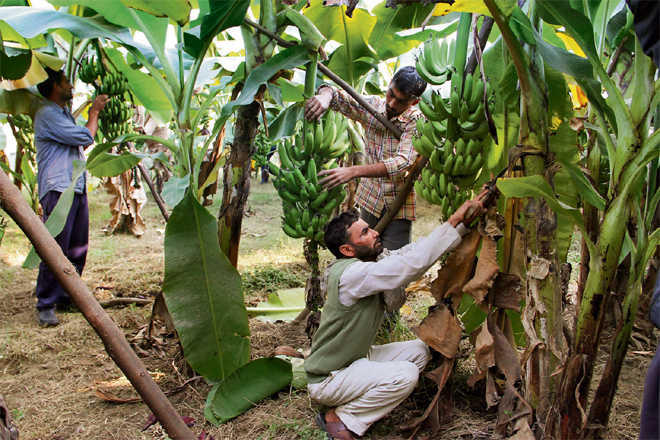
All Lose: Growers and consumers are both impacted by chemicals for ripening bananas.
BVC Mahajan
INDIA is blessed with diverse agro-climatic conditions and produces a wide range of fruits and vegetables. It ranks second in fruit and vegetable production in the world, after China. As per the database published by National Horticulture Board, during 2016-17, India produced 92.85 million metric tonnes of fruits and 175 million metric tonnes of vegetables. The country ranks first in the production of banana, papaya and mango. Unfortunately, these three fruits are commercially ripened by traders with calcium carbide, which is illegal and against food safety regulations.
Fruit-ripening poses a great health concern among the consumers. Although the natural ripened fruits (either ripening on the tree or off the tree) are good in taste and flavour, whole batches of fruits do not ripen uniformly. Moreover, it takes a longer time to complete the ripening process. The emergent market demand of ripened fruits cannot be fulfilled by natural ripening practices. Therefore, to regulate the supply chain in markets, hastening of the ripening process of fruits with the application of ethylene gas is a necessity during their commercial handling. This is a standard practice followed all over the world.
Ripening is a dramatic event in the life of a fruit, in which structure and composition of unripe fruit is so altered that it becomes acceptable to eat. Ethylene, a gas at physiological temperature, is a natural plant hormone involved in fruit-ripening. The autocatalytic production of endogenous ethylene immediately triggers the ripening process in banana, mango, papaya etc. The fruits produce large amounts of ethylene once ripening is under way.
Bananas, mango, papaya etc are commercially ripened with calcium carbide, popularly known as masala. Calcium carbide is usually kept in small paper packets in piles of bananas, papaya or inside the boxes or crates of mango fruits. The chemical comes in contact with moisture and gets hydrolysed, produces heat and acetylene gas which hasten the ripening process.
In the case of banana, the ripening starts within 24-48 hours, depending on ambient temperature. When the fruits yield to a slight finger pressure, they are kept under ice slabs for lowering the temperature and developing colour. Mango and papaya are ripened the same way with calcium carbide, but these are not kept under ice slabs. The fruits so ripened are overly soft, non-uniform in ripening and have a short shelf life.
In addition, it is dangerous to handle calcium carbide because of its explosive properties. The chemical is so reactive that it causes blisters if touched with wet hands. The low price of carbide results in its indiscriminate use in artificial ripening of fruits.
The use of calcium carbide for the ripening of fruits is banned by Food Safety and Standard Regulations of the Food Safety and Standard Authority of India (FSSAI).
Ethylene is a plant hormone, which acts physiologically and stimulates the ripening of fruits. It is known as the ripening hormone. No doubt, fruits contain natural ethylene, but its concentration is not enough to regulate the ripening. Therefore, fruits are required to be exposed to the desired level of ethylene for developing uniform ripening and acceptable quality. This technique is useful during the commercial handling of fruits. In this technique, the fruits are exposed to ethylene gas (100 ppm) in an airtight ripening chamber for 24-48 hours to induce ripening. The most important thing is the control of temperature and relative humidity inside the chamber, which should range between 16 -25 degrees and 90-95 per cent RH, depending upon the fruit. Ethylene gas is introduced inside the chamber with an ethylene generator.
Punjab Agricultural University has recommended the technology for ripening of banana fruits with ethylene gas under controlled conditions. Banana fruits harvested at the green mature stage can be successfully ripened in four days by exposing them to ethylene gas (100 ppm) for 24 hours in a ripening chamber maintained at 16-18 degrees and 90-95 per cent RH. The fruits attain uniform colour and excellent quality.
The technology can be used at wholesale markets. Though ethylene gas can promote ripening and colour changes, the quality of such artificially ripened fruit depends mostly on the maturity level of the fruit at the time of harvest. This technique provides a safe and effective method of ripening of fruit compared to the traditional technique of using calcium carbide.
The Food Safety and Standards- Second Amendment Regulation, 2016, under the FSSAI, has permitted the use of ethylene gas in the artificial ripening of fruits. The Food and Drug Administration (FDA) has also sanctioned the use of ethylene gas to promote the ripening of fruits and vegetables under Regulations 120, 1016.
Farmers, traders and other stakeholders are enlightened about FSSAI regulations regarding harmful and safe ripening techniques during training programmes conducted by Punjab Agricultural University, Punjab Horticultural Postharvest Technology Centre, Punjab Mandi Board, Department of Horticulture and Krishi Vigyan Kendra etc. The pilot facility with 46 ethylene gas based ripening chambers of capacity of about 460 metric tonne has been established by Punjab Mandi Board at 12 fruit and vegetable markets of Punjab. In addition, about 825 metric tonne capacity of ripening chambers established by private entrepreneurs has also come up in Punjab with the financial assistance of National Horticulture Mission. However, keeping in view the volume of these fruits in mandis, more infrastructure is required to be established in Punjab to replace the harmful and banned method of ripening with calcium carbide.



























